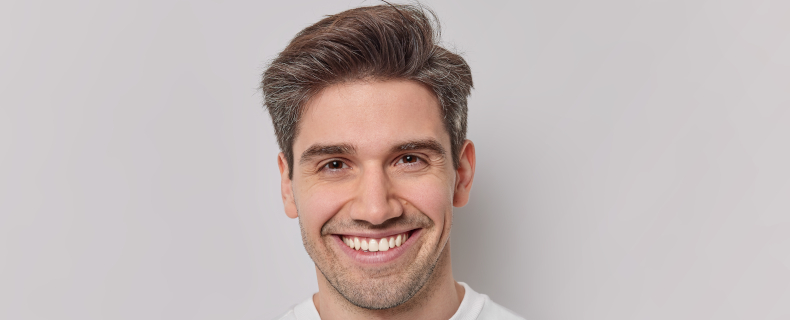For many, the mental image of treatment for sleep apnea – especially for obstructive sleep apnea, the most common type – is wearing a machine while sleeping. This mental image is of a Continuous Positive Airway Pressure device, or CPAP machine. Such a machine, with its hoses and its noise, can be intimidating, and may even give rise to reluctance to get sleep apnea treated, or even diagnosed.
Indeed, the CPAP machine does have drawbacks. Actual users report feeling claustrophobic, and being bothered by the noise (which can also prove troublesome for a partner). Some experience excessive airway in the stomach, which feels – and often presents itself in the same way as – digestive gas. Others note sore throat, and discomfort sleeping on the back or sides. It is likely that any or all of these reasons may be why CPAP machines have a fairly high rate of going unused: studies in the early 2010s suggest that discontinuation can be as high as 70%.
There are, however, other treatments for sleep apnea that do not involve use of a CPAP machine. What are they, and what are some advantages and disadvantages of each?
Lifestyle changes
One option for treating sleep apnea involves lifestyle changing.
Three changes in particular are noted as being most helpful.
- Stopping late-night alcohol consumption
- Quitting use of tobacco products
- Weight loss
Of course, the obvious observation here is that for several of these – specifically quitting tobacco and weight loss – the action taken is far easier said than done, as the roughly 15% of the population estimated to be addicted to nicotine and the approximate 41% of the population believed to be overweight might attest.
Moreover, while many of these changes carry other health benefits and are definitely worth pursuing, sleep apnea may persist despite these changes. Furthermore, there are people with sleep apnea who neither drink alcohol before bed, consume tobacco, nor are overweight. These lifestyle changes would not treat sleep apnea in such persons.
Surgical alternatives
There are a number of surgical procedures which can correct sleep apnea.
Two of the most common are:
Uvulopalatopharyngoplasty (or UPPP or UP3).
UP3 surgery involves the removal of some tissue in the throat, including the uvula (the node of skin that hangs in the back. A tonsillectomy is often performed at the same time.
UP3 surgery requires an overnight stay at the hospital. It can be painful, with a recovery time lasting for a few weeks, and afterwards there might be mild sore throat and dry mouth on waking. Sometimes, it may difficult to keep liquids from coming into the nose (which is typically temporary), and there might be permanent changes to the voice
Hypoglossal Nerve Stimulator insertion (Inspire)
Inspire involves the implantation of two devices. One is a sensor, to monitor nighttime breathing, which is attached to a pulse generator, which are collectively put in the upper chest. These connect to a stimulator, which is placed in the mouth to move the tongue and soft tissues aside and get the muscles to breathe if breathing stops.
Inspire can be inserted in an outpatient procedure, and has a full recovery time of a few days. It does require a number of follow-up visits to calibrate the device fully, and regular checkup visits.
Oral appliances
For people with slight or moderate sleep apnea for whom lifestyle changes prove ineffective, an alternative to the CPAP machine and surgery is an oral appliance. This most common type (which is specially fitted by a dentist) is similar to a mouth-guard or retainer and is placed over both top and bottom teeth by the patient. The appliance pushes the lower jaw slightly forward, which alters the nighttime position of the tissues that relax so that they no longer obstruct airflow. An appliance will allow the wearer to drink and be able to talk if necessary.
Appliances have an additional advantage. People who have sleep apnea (especially obstructive sleep apnea) typically also have bruxism, or teeth-grinding. In fact, over half of people who have sleep apnea (as high as 55% according to one study) will grind their teeth, as well. Scientists are not entirely sure why this is, although one theory holds is that the arousal from sleep to restore breathing may cause jaw movement and grinding. In fact, one study suggests that grinding is itself the actual motion which restores breathing.
Bruxism can cause a number of problems, including wear on the teeth and headaches. The oral appliance can prevent both of these.
Drawbacks to oral appliances include either dry mouth or excessive salivation, and possible jaw discomfort. They may also temporarily alter the bite in the early stages of use. Finally, appliances are not permanent, and will need to be replaced after about two years.
Treatments for sleep apnea that are not CPAP machines
A CPAP machine may seem intimidating to those who might need one and overly cumbersome for those who use them. However, there are alternative treatments. An excellent first step would be to consult a physician to see which would make the most sense going forward.
Sleep Apnea Treatment in Jeffersonville, Shepherdsville and Louisville, Kentucky
Sleep apnea is serious, and the only way to resolve the disorder is to receive treatment from a qualified medical professional—like the airway dentists at Exceptional Dentistry. We can treat your sleep apnea through ProSomnus or SomnoMed therapy. If you or someone you love is dealing with sleep apnea, schedule a consultation today.
Book Your Consultation
We are excited you found us and we hope you will take the first step to join our family.




